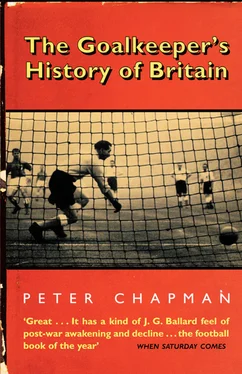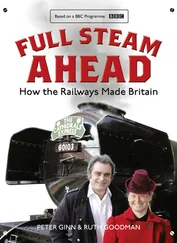This was possibly a reference to the Spanish goalkeeper, Ricardo Zamora, whom Hibbs and England came up against at Highbury in 1931. Revenge for the defeat two years earlier was duly extracted to the tune of a resounding 7–1. Zamora, who came with the reputation of being world-class, had a miserable game. What prompted more ridicule was the news that he earned £50 a week, compared with Hibbs’s wage of £ 8 during the season and £ 6 in the summer break. But the implication that the England keeper was always at his best against a showy continental was stretching the point. His better games were not abroad. He was more comfortable at home, closer to base, something which was reflected in his style of play. In keeping with the times, Harry was not one to advance happily beyond his goalkeeper’s area and into the broader reaches of the penalty box. By and large, he stuck firmly to his line.
In Hibbs’s protective shadow, a new breed was emerging. Its members were obliged to display the classical certainties of the tradition, yet felt able to add a touch of goalkeeping rococo. In Glasgow, Jack Thomson of Celtic made his reputation when Scottish keepers were expected to be no less soberly dignified than those south of the border. ‘There was little time for drama and histrionics,’ said local writer Hugh Taylor. The keeper who tried to invest his game with colour was regarded with deep-rooted suspicion, he added, and had as much chance of a successful career ‘as a bank clerk who went to work in sports jacket and flannels’.
Thomson could twist and change direction in midair. He also applied an extra thrust to his dives, to reach shots which would have been beyond others. This gift was compared to the hitch-kick later used by Jesse Owens, which won him the long-jump gold medal and world record in Berlin. All this, of course, could only be employed when the need for something spectacular arose. Thomson’s talent was not confined to his agility. As Taylor noted, he held rather than punched or parried the hardest of shots and there was no keeper more reliable. He ‘inspired tremendous confidence in the men in front of him, always watching play, combining rare, natural talent with a mathematical precision that took so many risks out of his often hazardous art’. Tragically, not all of them. He was a regular Scottish international by the age of twenty-two, but was killed in 1931 after diving and fracturing his skull at the feet of a Rangers forward at Ibrox Park.
Other young keepers who struck a popular chord followed. In 1932, Manchester City signed Frank Swift, aged seventeen. Goalkeeper for the third team, he was on ten shillings a week, so thought it financially wise to retain his job as coke-keeper at Blackpool gasworks. When City reached the 1933 Cup Final, he and a mate with a motor-cycle drove down to watch. Big for the time at 6 feet 2 inches and 13 stone 7 pounds, Swift squeezed into the sidecar. They left in the middle of the night in order to make the trip and, in the rain, managed to go off the road only once. Manchester City were more easily brushed aside, 3–0 by Everton. Swift soon found himself promoted in City’s pecking order of keepers and, on £1 a week, able to give up the gasworks. He made his debut for the first team on Christmas Day. When he was knocked out early on by the opposition centre-forward, his trainer brought him round by mistakingly spilling half a bottle of smelling salts down his throat. But in the months after, it was injury to the regular first-team keeper that left Swift in line for selection, as City won their way through to the Cup Final again in 1934. As the time approached to face this year’s opponents, Portsmouth, the prospect left him on top of the world one moment, he said, the next in fits of despondency. He told himself he was far too young to be playing at Wembley. With a ‘terrible, sinking feeling’, he saw the team sheet go up, with his name at the top of it.
He aimed to go to bed early the night before the game but shared a room with his team captain, Sam Cowan, who sat bathing a poisoned big toe in a bowl of hot water. Cowan kept him talking till 3 a.m. Swift reckoned later this was to make him sleep late and have less time for pre-match nerves. They got the better of him in the Wembley dressing room. The sight of a jittery senior player having to have his laces tied, he said, turned him green. The trainer hauled Swift off to the washroom, gave him a slap round the face and a tot of whisky. He made it through the parade on to the pitch and presentation to George V. Just after the game started, Matt Busby, Manchester City’s right-half, turned, shouted and passed back to him, to give him an early feel of the ball and calm him down.
Portsmouth scored after half an hour, for which Swift blamed himself. There’d been a brief shower of rain, which normally would have prompted him to put his gloves on. But he’d peered up the other end to see Portsmouth’s keeper had left his in the back of the net. Not trusting his own judgement, Swift did, too, and paid for it when a shot across him from the right slithered through his fingers as he dived. In the dressing room at half-time, the Manchester City centre-forward, Fred Tilson, told Swift to stop looking so miserable about it. Tilson added he’d score twice in the second half, which he did. The second came with only four minutes to go. Suddenly Swift, aged nineteen, realised he might be on the point of winning a Cup Final.
The photographers sitting at the side of his goal began to count down the minutes and seconds for him. Seeing how tense he was, they may have been trying to be helpful. Equally, men of Fleet Street, they might have had their minds on the story. Swift started to lose control of his with about one minute remaining. With fifty seconds left he was thinking of his mother and if the Cup would take much cleaning. At forty seconds he worried whether the king would talk to him. At thirty seconds, Matt Busby smashed the ball into the crowd to waste time and a photographer shouted, ‘It’s your Cup, son’. As the whistle went he stooped to get his cap and gloves from the net, took a couple of steps out of it and ‘everything went black’.
Swift was the favourite of millions of young fans thereafter. Among them was my dad, listening to the game on the wireless. He was to leave school at the end of that term, a month before his fourteenth birthday. For Swift at nineteen to be in a cup-winning team was enough in itself to make him a Kids’ Own hero. His faint in the Wembley goalmouth only heightened this. Though he was a virtual Superboy of the day, he showed himself vulnerable to pressure like anyone else, a big kid after all. Laid out on the turf, he was brought round by cold water poured on his face and dabbed by the trainer’s sponge. He was helped to his feet and limped across the pitch and up the steps to the Royal Box to get his medal from George V. The king spoke to him through what Swift described as a ‘dizzy mist’ and, at greater length than was customary, asked how he was, told him he played well and wished him good luck. The king sent a message the following week, via the Lord Lieutenant of the County of Lancashire, inquiring after Swift’s health.
Throughout his career, Swift showed himself to be not only a large person, but also a large personality. He’d turn and wave to the crowd, acknowledge their shouts, even chat if the ball was at the other end. He applied an occasional flourish to his leaps or dives for the crowd’s benefit. These were ‘flash’, though within limits. A dive when you could keep your feet, or a punch when a catch was feasible, was not the thing. Swift’s principle, however, was that as long as it was safe, where was the harm in the bit of extra for effect?
Among British keepers, Swift pioneered the skills of throwing the ball, something he’d picked up from watching water polo. Crowds tended to feel short-changed by a keeper doing anything but clearing the ball out of his penalty area with a hefty boot. But Swift had enormous strength and huge hands – the length of the average person’s foot – with which he could pick up or catch a ball single-handed. He’d hurl it over half the length of the pitch, and guide it far more accurately than could be accomplished with a hopeful punt. An extrovert character, it was one of the ways he imposed himself on the game. Swift was generally good at making himself known, not least to referees whose decisions he felt unable to go along with. Against the football hierarchy, he also became a vociferous campaigner for players’ wages and conditions.
Читать дальше












